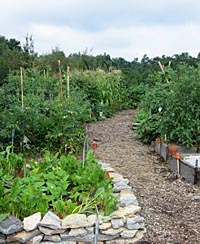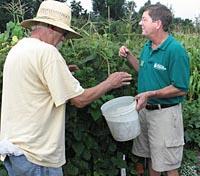Demo Gardens Educate Visitors and Provide for Hungry Kentuckians
Demo Gardens Educate Visitors and Provide for Hungry Kentuckians



Master Gardeners remove insects from plants by hand.
Since 1992, Master Gardeners in Fayette County have maintained a demonstration vegetable garden at the University of Kentucky/Lexington Fayette Urban County Government Arboretum. The garden has many objectives, including education and feeding the hungry in Kentucky by donating harvested items to a local food bank.
“Each week, we weigh what we harvest from the garden and then take it to God’s Pantry,” said Jim Wheeler, a Master Gardener involved in the Arboretum demonstration gardens. “This week we have about 14 pounds.”
Each year Master Gardeners meet in the fall to plan for the following summer. They map out the varieties they will plant and what practices they will use. The garden is entirely organic, so no pesticides or other chemicals are used.
Horticulture students at Blackburn Correctional Facility, a local minimum-security federal prison, start seeds in their greenhouses and deliver plants to the garden in time for spring and summer plantings.
“We start the direct-seeded crops ourselves in April, and the plants from Blackburn arrive usually in May,” Wheeler said. “Our purpose is to try different varieties of plants and different growing techniques. We experiment here with things we want to try to pass on to the home gardener.”
Ray Dueltgen has been a Master Gardener for nine years. This year he’s experimenting with remineralization in the demonstration garden. He said some horticulturalists in New England were thinking about how they use the same plots over and over to grow vegetables. They realized they must be exhausting the trace minerals in the soil, so they decided to add ground up granite dust to get the soil back to where it needed to be.
“We got interested in that, and we have some plots that are 50 percent treated with mineral dust taken from evaporated seed beds that go back 10 to 15 billion years,” Dueltgen said. “We’re trying to find out if we’ll see a difference in yields. It’s too early in the year to tell yet.”
Dueltgen said when he first started working on the gardens at the Arboretum, there were no raised beds and all the soil was clay. Little by little they have added compost, various types of organic materials and different types of raised beds. He said the most rewarding thing about gardening in a public place is the reaction of visitors.
“Seeing the yield that we show is rewarding,” he said. “We have many tourists. Last week we had 60 students from Wilmore come through. We lined them up in the garden and showed them that vegetables don’t come wrapped up in cellophane at the grocery store. I like to pull something from the ground and watch their eyes light up and tell them that’s where carrots come from.”
Three grants in the past few years have helped Master Gardeners at the Arboretum to buy tools and compost tumblers and implement organic gardening methods.
In addition to the vegetable demonstration garden, the Master Gardeners work with UK Cooperative Extension to maintain an herb garden and a handicap-accessible garden at the Arboretum. Contact the Arboretum for more information at 859-257-6955.